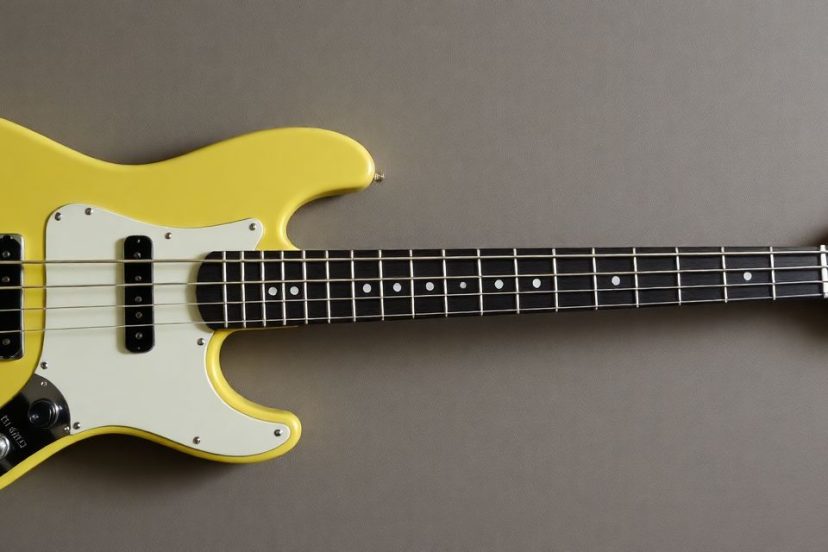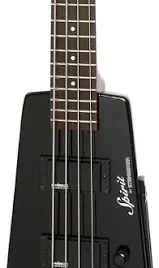Fender Bass Guitars: Precision vs. Jazz, Which Reigns Supreme?
I’ve had the pleasure of playing many instruments over the years, but there’s something special about Fender basses. This is a close look at the age-old debate between two of Fender’s most iconic models: the Precision Bass and the Jazz Bass. Both have left a lasting mark on music history, but which one truly deserves the crown?
Let’s start with the Precision Bass, affectionately known as the P-Bass. This bad boy has been around since 1951, and it’s not hard to see why it’s stood the test of time. When you pick up a P-Bass, you’re holding a piece of music history.
The moment you lay your hands on that chunky neck, you know you’re in for a treat. The P-Bass is all about that thick, punchy sound that cuts through any mix. It’s the hidden weapon behind countless hit records, from rock to country to R&B. That signature growl just demanded attention, and I felt like I could move mountains with each note.
But let’s not forget about the Jazz Bass, or J-Bass as it’s often called. Introduced in 1960, this sleeker, sexier cousin of the P-Bass brought a whole new flavor to the low-end game. The moment you strap on a J-Bass, you can feel the difference. That slimmer neck profile just begs for fast, intricate playing.
The J-Bass is all about versatility. With its two single-coil pickups, you can dial in a wide range of tones, from warm and mellow to bright and aggressive. Players use the J-Bass on everything from funk gigs to jazz sessions, and it’s never let them down. There’s something magical about that bridge pickup, when you really dig in, it gives you this growly, midrange-heavy tone that just screams attitude.
You might ask which one is “better.” But here’s the thing, it’s not about better or worse. It’s about what fits your style and the sound you’re after. I’ve seen players absolutely shred on a P-Bass, and I’ve seen others coax the most beautiful, subtle tones out of a J-Bass. It all comes down to your hands and your ears.
Fender Precision Bass vs. Fender Jazz Bass
Let’s break down some of the key differences:
| Feature | Precision Bass | Jazz Bass |
|---|---|---|
| Body Shape | Larger, more rounded | Slimmer, offset waist |
| Neck Profile | Chunkier, “C” shape | Slimmer, faster |
| Pickups | Split single-coil | Two single-coils |
| Tone | Punchy, focused | Versatile, brighter |
One thing I love about both basses is their build quality. Fender knows how to make instruments that can take a beating.
I’ve seen P-Basses from the ’70s that still play like a dream, and my own J-Bass has survived more than a few rowdy gigs without so much as a scratch.
The P-Bass, with its split single-coil pickup, gives you that classic, thumpy tone that’s perfect for rock, punk, and anything that needs a solid foundation. It’s like the bass equivalent of comfort food, warm, familiar, and always satisfying. When you need to lock in with the kick drum and create a wall of sound, the P-Bass is your go-to weapon.
On the other hand, the J-Bass offers more tonal options. With its two pickups, you can blend different sounds to find your sweet spot. Want a bit more bite? Dial up that bridge pickup. Need some extra warmth? Roll on the neck pickup.
It’s this flexibility that makes the J-Bass a favorite among session players and genre-hoppers. Now, let’s talk playability. The P-Bass, with its chunkier neck, might feel a bit intimidating at first. But once you get used to it, it’s like a firm handshake from an old friend. There’s something reassuring about wrapping your hand around that neck, it just feels right.
The J-Bass, however, is all about speed and finesse. That slimmer neck profile makes it easier to navigate the fretboard, especially when you’re playing fast runs or intricate lines. If you’re into slap bass or more technical styles, you might find the J-Bass more to your liking.
One thing to consider is the weight. Both basses can be on the heavier side, especially older models. If you’re planning on long gigs or extended practice sessions, you might want to look into newer, lighter versions or invest in a good strap.
Price-wise, both the P-Bass and J-Bass come in a range of options, from budget-friendly Squier models to high-end Custom Shop creations. You can find great deals on used instruments too. Just remember, a well-maintained Fender bass can last a lifetime, so it’s worth investing in quality.
In the end, choosing between a Precision Bass and a Jazz Bass comes down to personal preference. They’re both incredible instruments with rich histories and unique characteristics. Try them both. Spend some time with each one, play them through different amps, and see which one speaks to you.
Better yet, why not have both? I know plenty of bassists who keep a P-Bass and a J-Bass in their arsenal, switching between them depending on the gig or recording session. There’s no rule that says you have to pick just one!
Whether you go for the punchy authority of the Precision or the versatile voice of the Jazz, you’re getting a piece of bass guitar history. These instruments have shaped the sound of popular music for decades, and they continue to inspire players of all levels.
My Thoughts on Fender Bass Guitars: Fender Precision Bass vs. Fender Jazz Bass
The moment I pick up a P-Bass, I’m struck by its no-nonsense approach. That chunky neck feels substantial in my hands, inspiring confidence with every note.
The split-coil pickup delivers a punchy, focused tone that simply works in almost any mix.During a recent rock gig, I brought along my trusty P-Bass. As soon as I dug into those strings, the sound guy flashed me a thumbs up.That classic P-Bass growl cut through perfectly, providing a rock-solid foundation for the entire band. It’s this reliability that keeps me coming back to the Precision.
The Jazz Bass: Versatile Virtuoso
Switching to the J-Bass, the first thing I notice is the slimmer neck profile. It allows for faster, more intricate playing when the music calls for it. The dual single-coil pickups offer a wider tonal palette, perfect for genres that demand more sonic flexibility.

Frequently Asked Questions
Which is better for beginners, Fender Precision Bass vs. Fender Jazz Bass?
Both are excellent choices for beginners. The P-Bass offers simplicity and a classic tone, while the J-Bass provides more tonal options. Try both if possible and choose based on comfort and the sound you prefer.
Are Fender basses worth the price?
Fender basses offer professional-grade quality and have stood the test of time. While they can be pricier than some alternatives, their durability, resale value, and iconic tones make them a solid investment for serious players.
Can I use a Precision Bass for slap technique?
Absolutely. While the Jazz Bass is often associated with slap bass, many players effectively use the P-Bass for this technique. The P-Bass’s fuller tone can add extra punch to slap parts.
How do Fender basses compare to modern, active basses?
Fender’s passive designs offer a more organic, classic tone compared to active basses. While active basses provide more onboard EQ options, many players prefer the simplicity and warmth of Fender’s traditional approach.
Craftsmanship and Durability
One aspect of Fender basses that continually impresses me is their build quality. These instruments are built to last, often improving with age. The necks on both the P and J models have remained stable through countless gigs and temperature changes. This durability translates to peace of mind on stage. I never worry about my Fender basses letting me down mid-performance. They stay in tune, the electronics stay quiet, and the finishes hold up to the rigors of regular gigging.
Tonal Versatility
While each model has its signature sound, I’ve found both the P-Bass and J-Bass to be more versatile than many give them credit for. The P-Bass, often pigeonholed as just a rock bass, excels in country, blues, and even some jazz settings. Its focused midrange can be sculpted with amp settings to fit various genres.
The J-Bass, with its dual pickup configuration, offers even more tonal possibilities. By adjusting the blend between pickups and tweaking my playing technique, I’ve coaxed everything from thunderous lows to crisp, Jaco-esque mids from this instrument.
Modding Potential
For those who like to tinker, Fender basses provide an excellent platform for modifications. The abundance of aftermarket parts means you can customize your instrument to your heart’s content.
I’ve experimented with different pickups, bridges, and even necks on my Fenders, always finding it easy to return to stock if desired. This modding potential extends the lifespan and versatility of these basses. A P-Bass from decades ago can be updated with modern components while retaining its classic vibe.
Inspiration Factor
There’s something intangible about playing a Fender bass that’s hard to quantify. Perhaps it’s the knowledge that you’re using the same instrument as countless musical legends.
Maybe it’s the way these basses seem to inspire certain types of playing. When I pick up my P-Bass, I find myself naturally gravitating towards simpler, more groove-oriented lines. The J-Bass often inspires me to explore more melodic territory. This subtle influence on playing style is part of what makes these instruments special.
Final Thoughts, Are Fender Basses Still Relevant?
After extensive time with both the Precision and Jazz Bass models, I can confidently say these instruments stay as relevant as ever. Their timeless designs continue to inspire players across genres, offering a perfect blend of classic tone and modern versatility.
While there are certainly other great basses on the market, the P-Bass and J-Bass hold a special place in my arsenal. Their reliability, tonal quality, and sheer playability make them indispensable tools for any serious bassist.
My experiences with Fender basses have been overwhelmingly positive. From late-night club gigs to professional recording sessions, these instruments have never let me down.




